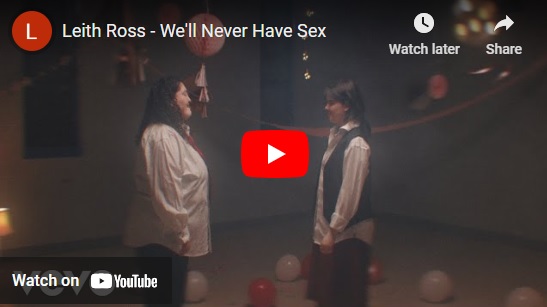In a short time, Ottawa-born, Winnipeg-resident Leith Ross (they/them pronouns) has gone from obscurity to internet sensation, thanks to their viral TikTok singles “Orlando,” and especially, “We’ll Never Have Sex.” The latter song amassed more than 37 million Spotify streams, over a million video views, and inspired countless covers/TikTok videos from ardent fans.
In 2022 alone, Ross performed sold-out headlining shows across North America and supporting slots on tour with Lord Huron, Andy Shauf, and Helena Deland in Europe. They received the inaugural John Prine Songwriter Fellowship at the Newport Folk Festival; were dubbed Gen Z’s new favourite songwriter by NME; and signed a global deal with Interscope/Republic Records. Ross’s success has been shockingly swift – much like their songwriting process.
“I never write songs over a period of time, really,” says Ross. “I’ll have a feeling about something, and then I’ll get the feeling that I could write a song about it. Then the songwriting process will be the only thing that I can think about, or do, for, like, an hour or two. It’s very intense and overwhelming, and then it’s over.”
By contrast, the recording process for Ross’s 2023 debut album To Learn was intentionally slow, with Ross being given the space and emotional safety required to capture their sensitive, authentic music. They recorded with Joey Landreth (of Bros. Landreth), whose musicianship Ross has long admired. Their close and collaborative friendship, and the recording studio’s proximity to Ross’s home, allowed for a “chill” and “spontaneous” process.
“It’s really nice when you’re recording very vulnerable music,” says Ross, “to have the time to sit with it, and take your time making decisions. Sometimes, if I was coming up with a pretty vulnerable song… instead of recording for half the day, we would just be crying, and talking, and working through it, for which I’m so grateful. It really changed the way I felt about recording music.”
That vulnerability is the hallmark of several of their songs, including “We’ll Never Have Sex” – which has struck a chord among an audience that identifies with Ross’ deeply personal, yet universal lyrics. They give voice to complex feelings about romantic relationships and sexual intimacy. For fans, the song speaks (among other interpretations) to the queer experience, asexuality, and the desire to enjoy another person’s company without the expectation of having sex.
“When I wrote it,” says Ross, “I really was feeling so isolated by the feelings that I was having. I felt like the people that I talked to didn’t really know what I meant.” To see how strongly – and differently – the song has resonated with listeners has been surprising to the artist, and “insanely therapeutic.” Ross says, “Everyone is just experiencing their own humanity, but I’m lucky enough to be able to facilitate a part of that expression.”
The official video for “We’ll Never Have Sex,” which Ross directed, produced, and starred in, features Ross and their real-life friend Fontine, playfully dancing in circles while wearing drawn-on moustaches. The splendid scene evokes images of innocence, and the slow swirl of being on a merry-go-round. Ross attributes the magic of the video to the communal efforts of their friends, who participated in the shoot. Friendship and community are vitally important to Ross, but in contrast to the speed of their success, finding safety in that kith and kin has come far more slowly.
For those of Ross’s fans whose vulnerabilities aren’t yet cushioned by an accepting community, they acknowledge that it can be a long process – one that requires “trial and error, purpose and intention.” For anyone feeling isolated, Ross offers these words of advice: “Be patient and kind. If you’re kind, and you make a real effort to support the community that you want to be a part of, then it’ll work out.” After a reflective pause, they add that it’s important to allow everybody their own humanity, while also maintaining one’s own boundaries.
Such wisdom has been hard-earned, through Ross’s lived experience. It’s as if they’re speaking softly from their soul to themself, while also facilitating the humanity and healing in others. Which is how their sad songs, to which everyone can relate, can land hope in the hearts of those willing to receive the message.
